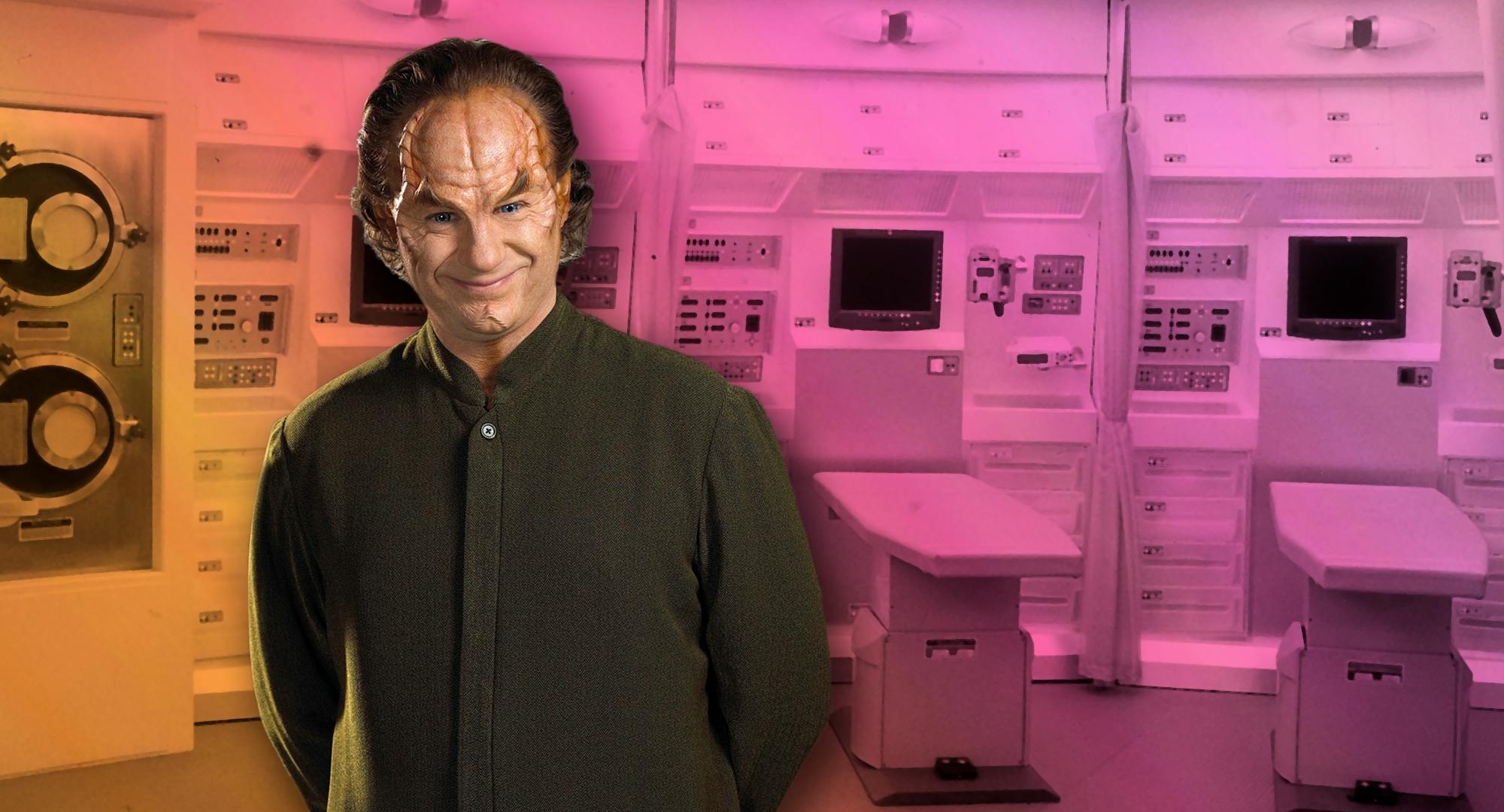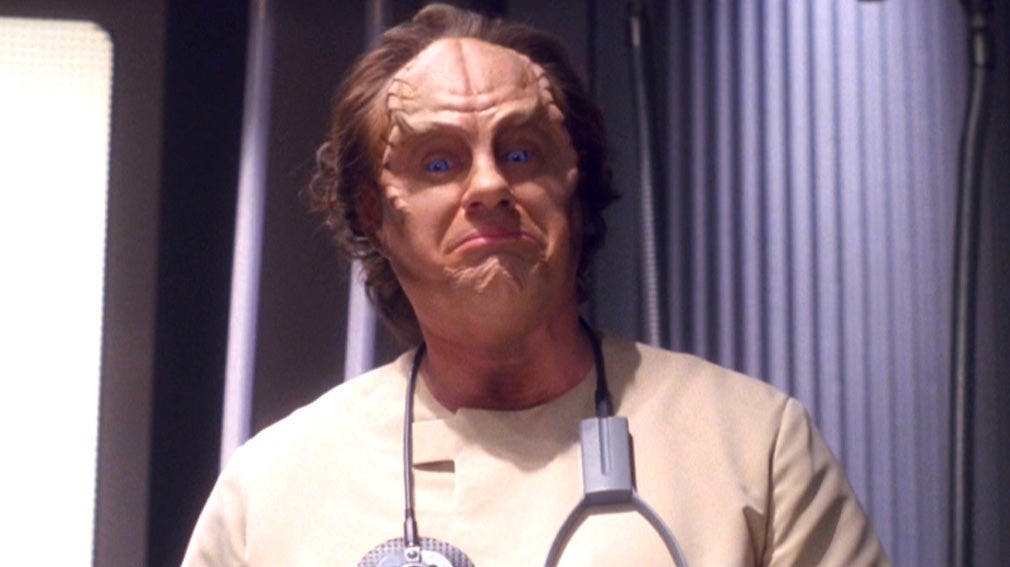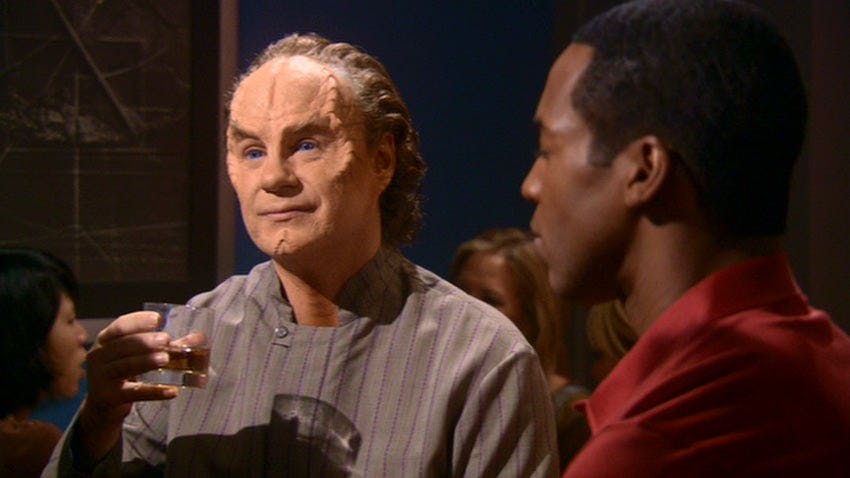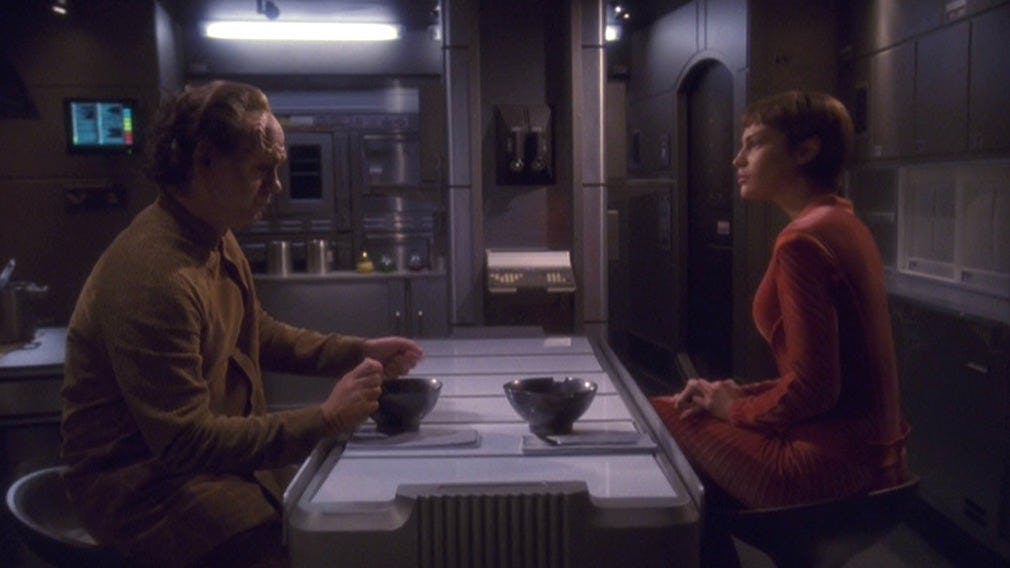Published Sep 27, 2021
Enterprise Reminds Us That Humanity is Not the Center Of the Universe
Dr. Phlox's relationship to human culture shows how alien humanity can be.

StarTrek.com
At its core, Star Trek has always been a franchise about exploration. Exploration of moral quandaries, exploration of one’s inner-self, and of course, exploration of outer-space, and the species that inhabit it. The famous opening monologue of The Original Series declares that the Enterprise’s mission is to “explore strange new worlds, to seek out new life, and new civilizations.” But for the majority of Star Trek’s run, those new civilizations have always been non-human ones.
Part of the draw of The Original Series for viewers in the 1960s was the spectacle of getting to explore alien planets, species, and cultures alongside Captain Kirk and his crew, but as the Star Trek franchise grew bigger and began to expand, the way in which alien worlds were explored changed as well. When the franchise was revitalized with The Next Generation, the show took a more hands-on approach to alien cultures, and instead of just discovering or making First Contact with them like in The Original Series, Picard and his crew navigated inter-planetary politics and helped solve culture-specific crises.
However, it wasn’t until Star Trek: Enterprise that the universe finally turned the lens inward, and went where no Trek show had gone before, by daring to explore a universe in which humanity is the strange, alien species to be discovered. Although humanity’s foreignness is touched on through characters like Quark in Deep Space Nine and Seven of Nine in Voyager, Enterprise uses Dr. Phlox and T’Pol to flip the script — examining and criticizing humanity through a lens usually reserved for other alien species.

StarTrek.com
When we first meet Doctor Phlox in “Broken Bow,” he’s on Earth as a part of the Interspecies Medical Exchange, and jumps at the chance to serve aboard the Enterprise, telling Captain Archer, “What better time to study human beings then when they’re under pressure? It’s a rare opportunity.” Usually, when a character on Star Trek is talking about the study of an alien species, it’s a human doing the studying. But the very fact of Phlox’s presence on the Enterprise is a constant reminder that Earth has just as much to be explored as any other planet.
Phlox treats humanity just as Captain Kirk might treat an alien species he’s coming across for the first time - he’s delighted by the idiosyncrasies and quirks of our species, and often takes note of things that we might otherwise consider to be normal behavior. In the episode “Stigma”, when one of Phlox’s wives, Feezal, comes aboard and takes a romantic interest in Commander Tucker, Phlox has no objection because it’s perfectly normal in Denobulan culture.
Of course, we as the human audience know that polyamory isn’t considered a “normal” relationship on Earth, but Enterprise reminds us that Phlox, Tucker, and Archer populate a universe where human culture is not the end-all-be-all, nor is it deemed “normal” by other species. Feezal and Phlox are both amused by how flustered Tucker is about the prospect of having multiple romantic partners, because to them, it’s a unique quirk of an alien culture that goes against what they know as normal. This dynamic is a complete subversion of how Star Trek usually presents alien cultures — instead of Tucker laughing at Phlox and Feezal, it’s the two of them who find his odd human characteristics to be so intriguing.
Although Phlox’s introduction frames his fascination with human culture and his time spent on Earth as something lighthearted — his fondness for egg drop soup, for example — things can also turn sour very quickly. Phlox is curious by nature, and tends to view humans optimistically, but he isn’t always extended the same kindness, and the unfortunate human trait of Xenophobia is put on full display in the episode “Home.”

StarTrek.com
Phlox accompanies the crew back to Earth in the aftermath of the Xindi attack, and despite Malcolm’s warning, persists with coming to shore even though the Lieutenant warned him of anti-alien sentiment. Phlox pays the price for his optimism when an unruly man approaches him in a bar because of his race and attempts to get him to leave — although at first Phlox is unsure why he’s being targeted, he quickly realizes it’s because he’s in alien, even though Denobulans had nothing to do with the Xindi attack.
It’s a very extreme example, but the concept of alien crew members being outcasts because of their race is a theme that persists throughout Enterprise, mainly through T’Pol and Phlox. In shows like The Next Generation, humans and other alien species in Starfleet interact with one another with virtual seamlessness — there’s very little tension among crewmembers purely based on species, but Enterprise examines a time in which it wasn’t always that way.
Although the crewmembers of the Enterprise may not be threatening Phlox or trying to attack him on sight because of his drastically different appearance, he’s still a clear outcast from the rest of the crew, and often struggles to fit in with his human counterparts. This struggle is shared (and highlighted) by his conversations with T’Pol, who is the only other non-human crewmember on Enterprise.
In the episode “Doctor’s Orders”, when the rest of the crew has been put in stasis, Phlox and T’Pol have the entire ship to themselves, and when we see them share a meal, we understand how much of a quiet struggle it must be to live among a species with an entirely different set of customs and ideologies. T’Pol and Phlox commiserate over Chef’s inability to properly create dishes from their homeworlds — a small but meaningful reminder of how humanity can sometimes fail to understand the nuances of alien cultures.

StarTrek.com
While for the most part Phlox and T’Pol are able to communicate and work efficiently with the rest of the Enterprise’s crew, episodes like “Doctor’s Orders” and “Home” are reminders that despite what we might think, humans are not the center of the universe. Thanks to people like Phlox and T’Pol, however, who are willing to brave the unknown and immerse themselves in human culture, we as a species are one step closer to getting to know the rest of the universe.
Lauren Coates (she/her) is a Chicago-based student with a weakness for junk food, a passion for film & television, and a constant yearning to be at Disney World. You can find her on Twitter @laurenjcoates.

